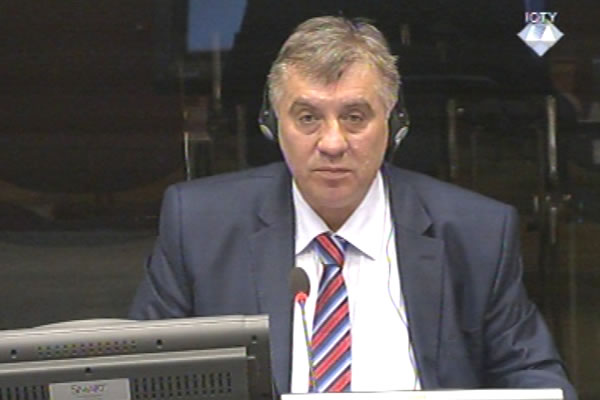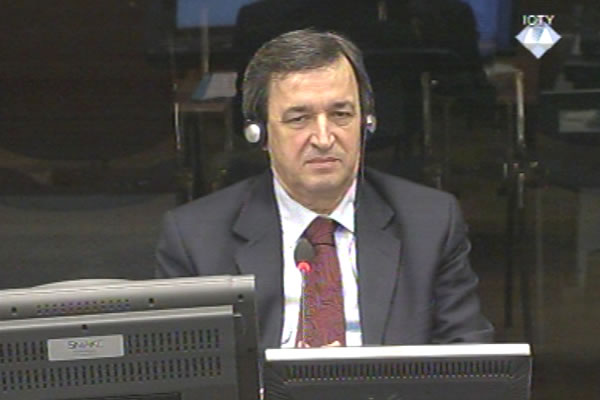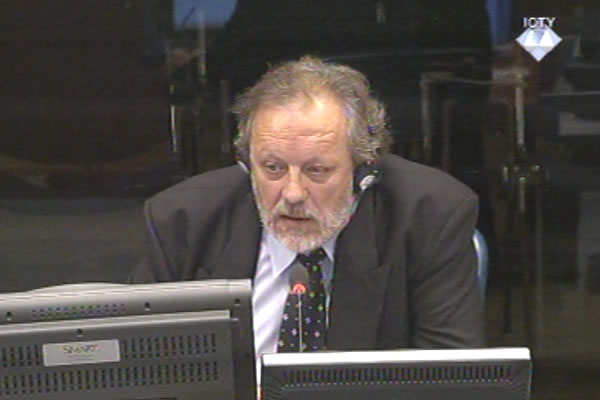Home
MLADIC’S ‘SCHIZOPHRENIA’ AS KARADZIC’S DEFENSE
Former Bosnian Serb police minister contends that there were ‘elements of schizophrenia’ in the excerpts from Mladic’s diaries that indicate Karadzic played a role in covering up the Srebrenica crimes. Two other witnesses – Mile Dmicic and Miroslav Toholj – denied that the accused had known about the crimes. Dmicic and Toholj called the allegations about the Srebrenica genocide a ‘farce’ and ‘propaganda prepared in advance’
 Tomislav Kovac, witness at the Radovan Karadzic trial
Tomislav Kovac, witness at the Radovan Karadzic trial In Radovan Karadzic’s re-examination of Bosnian Serb war-time police minister Tomislav Kovac, the witness denied that the accused had participated in the cover-up of the Srebrenica massacre. In the cross-examination last week, the prosecutor showed the witness an excerpt from General Ratko Mladic’s war diary. On 22 March 1996 Mladic writes Karadzic said that on the eve of a visit of the US Secretary of State, a ‘great show [was put on] for Albright’, who expected to ‘find 1,200 Muslim bodies near Pilica, and they only found about five bodies’.
Kovac thought Mladic’s diary entries were not reliable. In Kovac’s view, there were many ‘elements of schizophrenia’ and ‘diminished capacity’. This is why Kovac’s ‘policeman’s intellect doesn’t allow me to say what I think about them’. After his daughter’s demise, the military commander was in a difficult state of mind and was susceptible to ‘clever manipulations’ by the military security officer in the Main Staff, Ljubisa Beara, Kovac explained. The fact that the killing operation went on so quickly, Kovac noted, proves that Beara worked on his own. The initial plan was to take the Srebrenica prisoners to the military barracks in Zvornik, but Beara acted quickly to redirect the convoys to the executions sites where the graves had already been dug.
In one of his previous interviews with the OTP investigators the witness stated that Karadzic’s order to launch an investigation in April 1996 was just ‘eyewash’, or cover up. Kovac claimed that Karadzic had to issue a warrant to arrest Mladic instead. The witness confirmed his earlier claims in his evidence, suggesting that the army, primarily Beara’s military security service, covered up the information about the crime in Srebrenica. On the other hand, during the ‘secret investigation’ in September 1995, Kovac’s police team was able to establish easily what had happened after the fall of Srebrenica. Judge Kwon noticed that as the president, Karadzic was in a position to obtain all the relevant information about the genocide even more easily. The witness said it was not so easy, because the police were the president’s ‘eyes and ears’. As the minister, he didn’t want to inform Karadzic about the findings of the investigation before the war was over, Kovac said.
Karadzic’s war-time head of office for civil affairs Mile Dmicic also claimed that in July 1995 the accused didn’t know about the executions of the captured inhabitants of Srebrenica. As a ‘humane person’ Karadzic would never allow it, Dmicic argued. In the cross-examination, Dmicic argued that he never saw the reports in London newspaper The Independent about the large-scale crimes following the fall of Srebrenica. The reports were published on 17 July 1995. Since he hadn’t seen the reports, Dmicic did not report this to the president. Dmicic’s job was to deal with the incoming correspondence in the president’s office, but he claimed that in late July and early August 1995 he didn’t see the letters sent by UN high-ranking officials Mazowiecki and Akashi. The UN officials protested against the forcible evacuation of almost 40.000 Srebrenica inhabitants and expressed their fears that thousands of men may have been executed. The President was supposed to receive the letters personally, Dmicic explained, but since he was not in Pale at the time it remained a mystery where such important correspondence had ended up. In his recent evidence Karadzic’s war-time advisor John Zametica claimed that he had not seen the letters either. Dmicic agreed with former advisor of the accused Gordan Milicic, who claimed in his testimony before the Tribunal that the allegations about the Srebrenica massacre were a ‘farce’.
At the beginning of the evidence of Miroslav Toholj, Karadzic’s friend and information minister in the wartime Bosnian Serb government, the accused read out the summary of his statement, which conformed to the pattern of the evidence of previous Srebrenica witnesses. Toholj claimed that Karadzic didn’t know about the crimes against the Muslim captives. The foreign media started reporting on the horrible crimes even before the operation was finished, which, in Toholj’s view, meant that the ‘propaganda campaign’ had been prepared beforehand. Toholj will continue his evidence tomorrow.
Photos
Linked Reports
- Case : Karadzic
- 2013-11-01 DID KARADZIC ‘HAVE NO IDEA’ OR DID HE ‘KNOW EVERYTHING’?
- 2013-10-31 MILENKO ZIVANOVIC IN THE HAGUE FOR THE FIRST TIME
- 2013-10-30 WITNESS ‘HAS NO CLUE’ ABOUT SREBRENICA ‘MASSACRE’
- 2013-11-05 FOR TOHOLJ, SREBRENICA WAS A ‘VATICAN CONSPIRACY’
- 2013-11-06 WAR CRIMINAL OR ‘INNOCENT OBSERVER’
- 2013-11-07 MOMCILO AND RADOVAN DRAW MAPS, YET AGAIN


